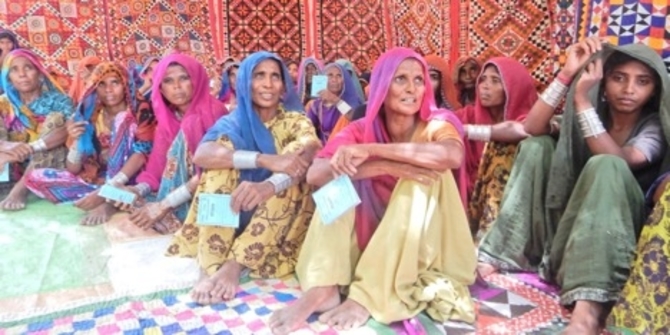The construction of the Chinese-funded Belt and Road initiative in Pakistan has caused much disagreement in Pakistan. With a rising anti-China sentiment amidst the growing tide of populism across the country, Sahima Gupta (LSE) and Anant Venkatesh (LSE) argue that the Pakistani government must pander to such sentiments while simultaneously balancing its commitment to China as a valuable investor.
China became a generous investor in the Pakistan economy after the global financial crisis of 2007-08, which rendered the nations of Europe unable and unwilling to invest in the developmental programmes of other nations of the global south. China’s controversial One Belt One Road (OBOR) policy, announced in 2013, has undertaken infrastructural development in 152 nations and the creation of the 21st Century Maritime and Land Silk routes that shall facilitate global trade for generations to come. Chinese investment in Asia amounted to a mere $45 billion in 2004, as compared to its $613 billion investments in 2016. Chinese investments and loans cost the country receiving such capital 30 per cent less than the market price and the construction of the ports, roads or railways in less than three years. The only other alternative investor for Pakistan on such a scale has been the United States, whose terms of investment have appeared to be less attractive to most developing nations, and therefore ultimately only offering a fraction of Chinese investment.
Neo-colonialism and China’s Belt and Road
The OBOR policy has been criticized as a form of neo-colonialism by many, including Malaysian Prime Minister Mahathir Mohammad. The policy involves the Chinese granting loans at reasonable interest rates to rejuvenate an economy. Such investment is tied to the Chinese-funded construction of the roads, railways, ports and other assets that are a part of the global trade network the super power envisions as a part of the modern-day silk route.
These interest rates, however, increase over time with the construction of Chinese assets on a nation’s territory, thereby making it economically unviable in the long run. In several impoverished nations, due to the vast amounts of capital pumped into the economy, high levels of inflation, combined with severe unemployment (as the Chinese construction companies prefer the usage of imported Chinese labour, instead of a reliance on local populations), have characterised such investments. A possible eventuality in the aftermath of such alterations in the economy is the nation’s trade deficit with China, and subsequently China’s profits increasing at an exponential rate, and the country in receipt of such investments, being forced into indebtedness. As a result, the country is forced to sell the newly constructed asset in its entirety to China, as a penalty for defaulting and also accepting an increased influx of cheaper Chinese goods into their markets. This occurred in Zambia, in 2018, when it lost the Kenneth Kaunda International Airport to China, and in Sri Lanka, which saw the leasing of the Hambantota port to China for a period of 99 years; much to the alarm of its neighbour India. Kenya, at the brink of insolvency, risks losing the Mombasa port in a similar fashion to China.
Many heads of state have dubbed the OBOR policy as a major instrument of China advocating an opportunistic and expansionist policy by gradually destroying one’s indigenous industries and by occupying large tracts of land. The usage of the term “neo-colonialism” is aimed at reminding one of similar methods employed by European powers in making inroads into the global south in the 17th and 18th Centuries and eventual subjugation of the economies of the colonized nations to their European masters.
Consequently, a pattern of opposition to such a genre of Chinese intervention has been forming across the globe which has occupied a key issue in elections and has led to several regimes being voted out for their advocacy of such trans-national partnerships. Significant victories of candidates pitching an anti-China policy and capitalizing on the notion that the pro-China regimes in power may overextend themselves have been witnessed in Maldives (whose debts to China totalled $1.2 billion), in Brazil under Bolsonaro, in Malaysia under Mohammad and in Sri Lanka deposing Rajapaksa. In addition to the countries mentioned above, the failure of the OBOR policy was seen in Venezuela and Europe. Myanmar called for the immediate cessation of the construction of a port, while the Chinese embassy in Karachi, Pakistan witnessed a bomb attack by militants opposing Chinese expansion on Pakistani soil.
CPEC in Pakistan
In 2015, both China and Pakistan signed agreements to set in motion the ambitious China- Pakistan Economic Corridor (CPEC). The project was launched with the understanding that it will be a “game changer” for Pakistan’s economic crisis. It involves the construction of various infrastructural projects such as transportation networks, energy projects and special economic zones.
While the project might be bringing in the much needed infrastructural development in Pakistan, it is doing it at an unsustainable cost, taking a huge toll on its economy. The provision of aid from China’s side is a clear façade as only Chinese enterprises will be reaping the actual profits. Pakistan is a poor country and will not be able to return such a heavy debt. For example, upgrading the railway line from Karachi to Peshawar was initially costed at $8.2 billion. However, according to recent reports the cost has increased to $9 billion, making it one of the most expensive CPEC infrastructural projects. In fact, the current debt, which needs to be repaid to the Chinese government, stands at $15 billion, not including $6.7 billion in Chinese commercial debt.
Alice Wells, the US South Asia Assistant Secretary has said, “It’s clear or needs to be clear that the CPEC is not about aid. This is almost always the form of loans or other forms of financing, often non-concessional with sovereign guarantees or guaranteed profits for Chinese state-owned enterprises that are repatriated to China.”
The CPEC also had a goal of enhancing regional cooperation. However, five years since its initial launch, the reality is completely different. A large part of this failure could be attributed to Pakistan’s current actions: the country needs to drastically improve relationships with its neighbours; solving territorial and cross-border conflicts. Without first achieving this, regional cooperation is extremely difficult.
Rise of anti-China sentiment and Islamism in Pakistan
China is perceived by most Pakistanis as an atheistic, communist hegemon impinging upon their sovereignty and religiosity. The potency of nationalism has been underestimated by the regimes in power which have preferred close co-operation with China in order to fulfil either vested interests or lease out the country’s resources in order to gain some apparent benefit in the future. Despite most in the nation not being acquainted with the intricate details of the infrastructure development projects and the conditionality of Chinese aid, the influx of Chinese capital, labour and services at the clear expense of Pakistani interests and welfare has led to a boomerang effect. Far from drawing the two nations closer at the grassroot level, the sentiment towards China is highly antagonistic and has led to a reinforcement of Islamic identity as a unifying factor in expressing discontent at one’s sovereignty being interfered with.
In popular political rhetoric in Pakistan, China is being compared to the British East India company and the OBOR initiative is seen as nostalgic when considering the country’s colonial past. Responsible for terror attacks against the Chinese involving grenade attacks, kidnappings and shooting are Islamist organizations, such as the East Turkestan Independence Movement and Al Qaeda. Islamic seminaries in Karachi served as the sources for discontented youth indulging in attacks on official embassy buildings and officials working therein. The situation has been exacerbated by Chinese labourers being imported into Pakistan to work on the OBOR projects, much to the chagrin of the unemployed Pakistani working-class youth. There has been a significant lull in the frequency of the attacks since the election of Imran Khan as Prime Minister, who has acknowledged the perils of increased cooperation with the Chinese.
But, although Khan’s government has expressed reluctance towards pursuing the project, the real reason for aversion has been rooted in his criticism of the erstwhile Sharif government’s corruption and fraud involving OBOR; an aspect he does not wish to replicate and draw flak. However, considering the Pakistani military’s dominance and great sway in administrative matters since its inception in 1947, will the government be able to resist the army’s affinity towards China and co-operation against the common regional rival of India? With the Washington Consensus failing and no other regional alternative sources of financial support available to a declining economy, the Pakistani government must play its cards carefully and walk the diplomatic tightrope between the pitfalls of accepting Chinese aid or opening a dialogue of rapprochement with India.
This article gives the views of the author, and not the position of the South Asia @ LSE blog, nor of the London School of Economics. Image: Asphalt Construction Road. Credit: Sumanamul15, Pixabay.







